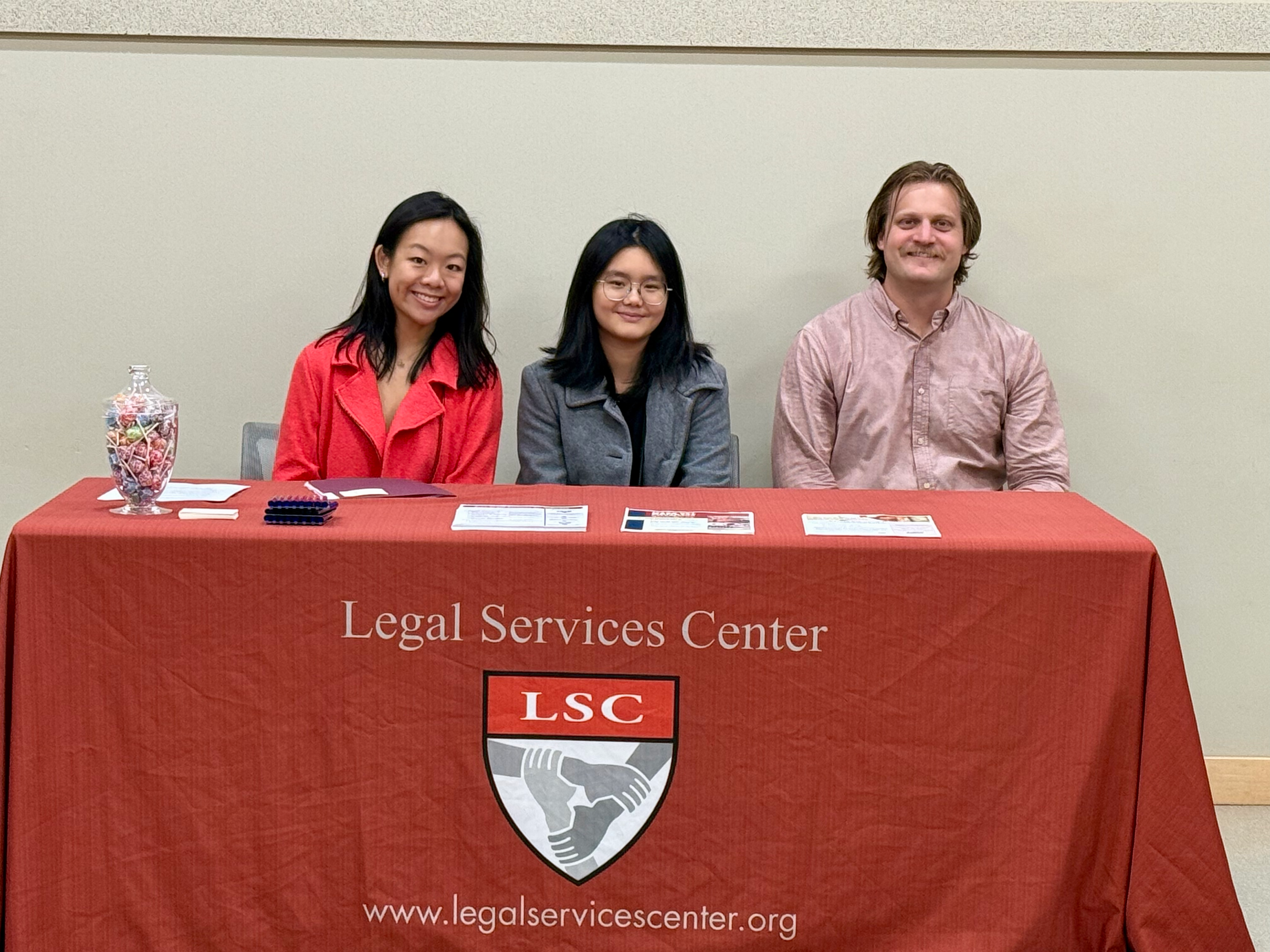

When Noelle Leow LL.M. ‘26 walked into the Cambridge Public Library to conduct a community education session on healthcare proxies, she experienced something she had never encountered during her three years studying law at Oxford University. Standing before members of the public, she presented the ins and outs of Massachusetts law and helped attendees execute legal documents on the spot, translating complex legal concepts into layman’s language. “I felt very satisfied seeing people become empowered to take ownership of their own estate plan,” Leow says. As a student who had spent years immersed in theoretical legal study, this moment was one of many in Harvard Law School’s Veterans Law and Disability Benefits Clinic that has brought her legal education to life.
LL.M. students like Leow join HLS from all over the world, bringing a wide array of backgrounds to the year-long program of specialized legal study. Having only one year to make the most of all that Cambridge and HLS have to offer, many LL.M. students opt to join a clinic to have a chance to step into American courtrooms under the supervision of expert attorneys, bringing their legal education to bear while representing clients facing myriad challenges. At the WilmerHale Legal Services Center (LSC), which houses six HLS clinics, LL.M. students gain a firsthand look at the American legal system at work as they offer pro bono representation to clients in areas including housing law, consumer protection, public benefits law, tax law, and more.
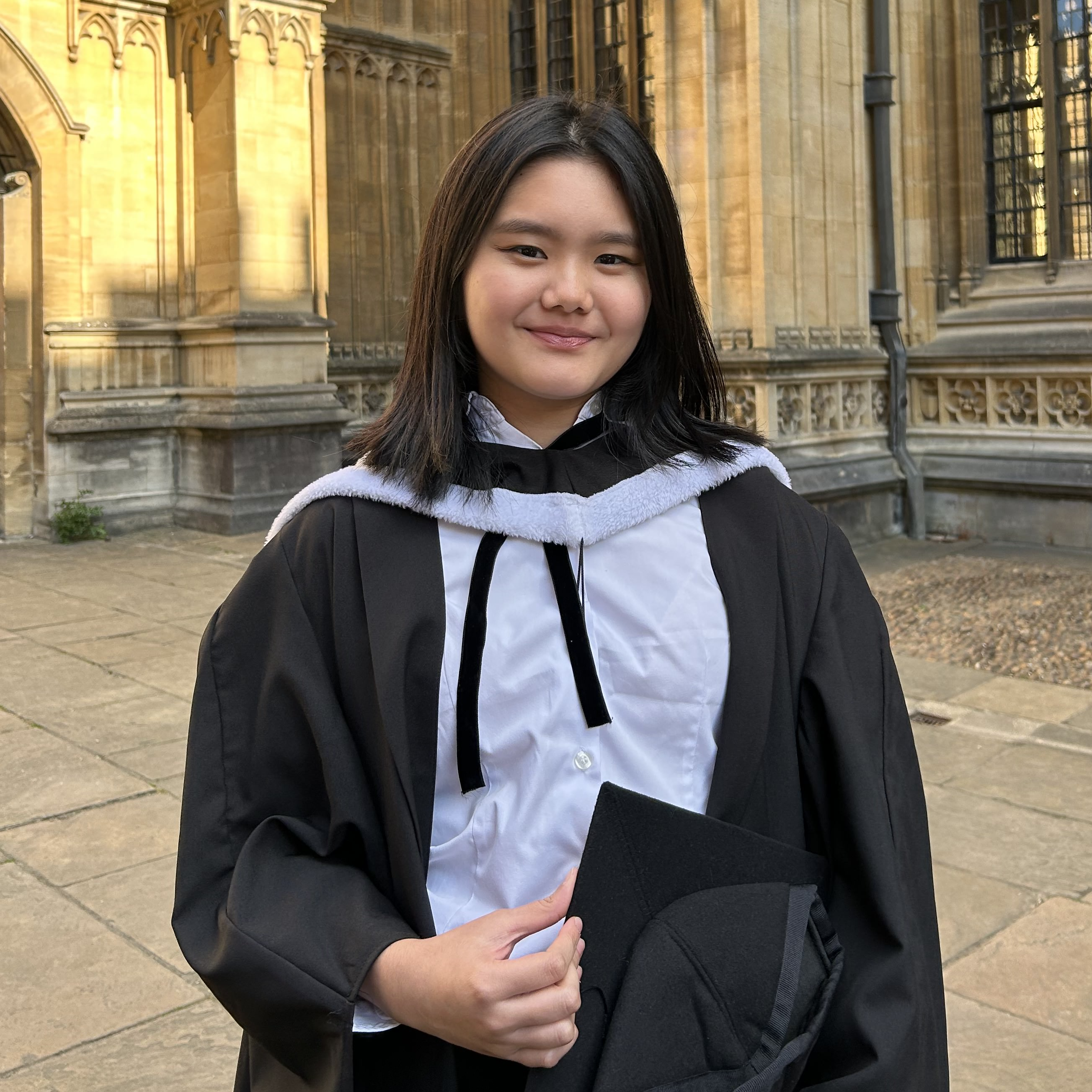
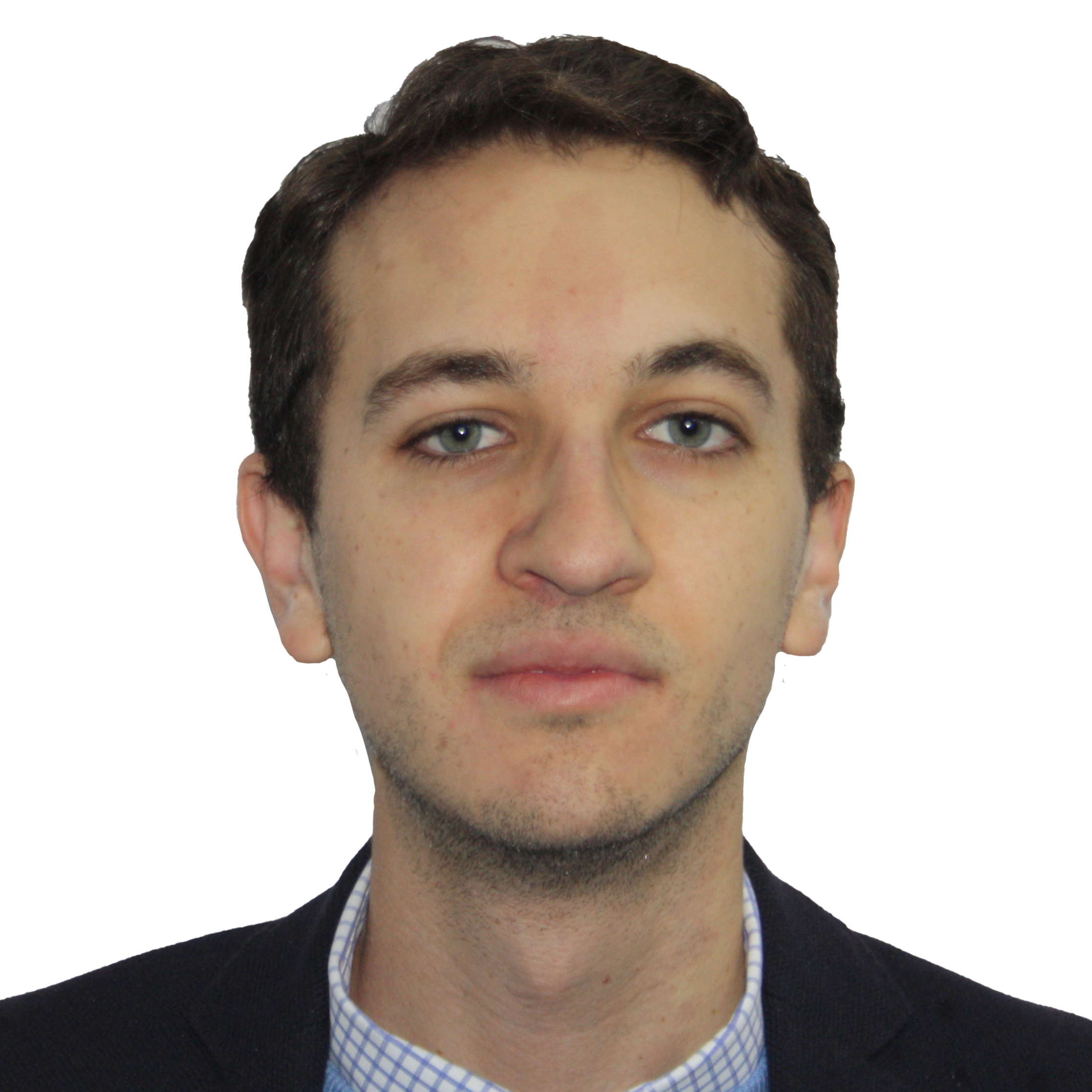
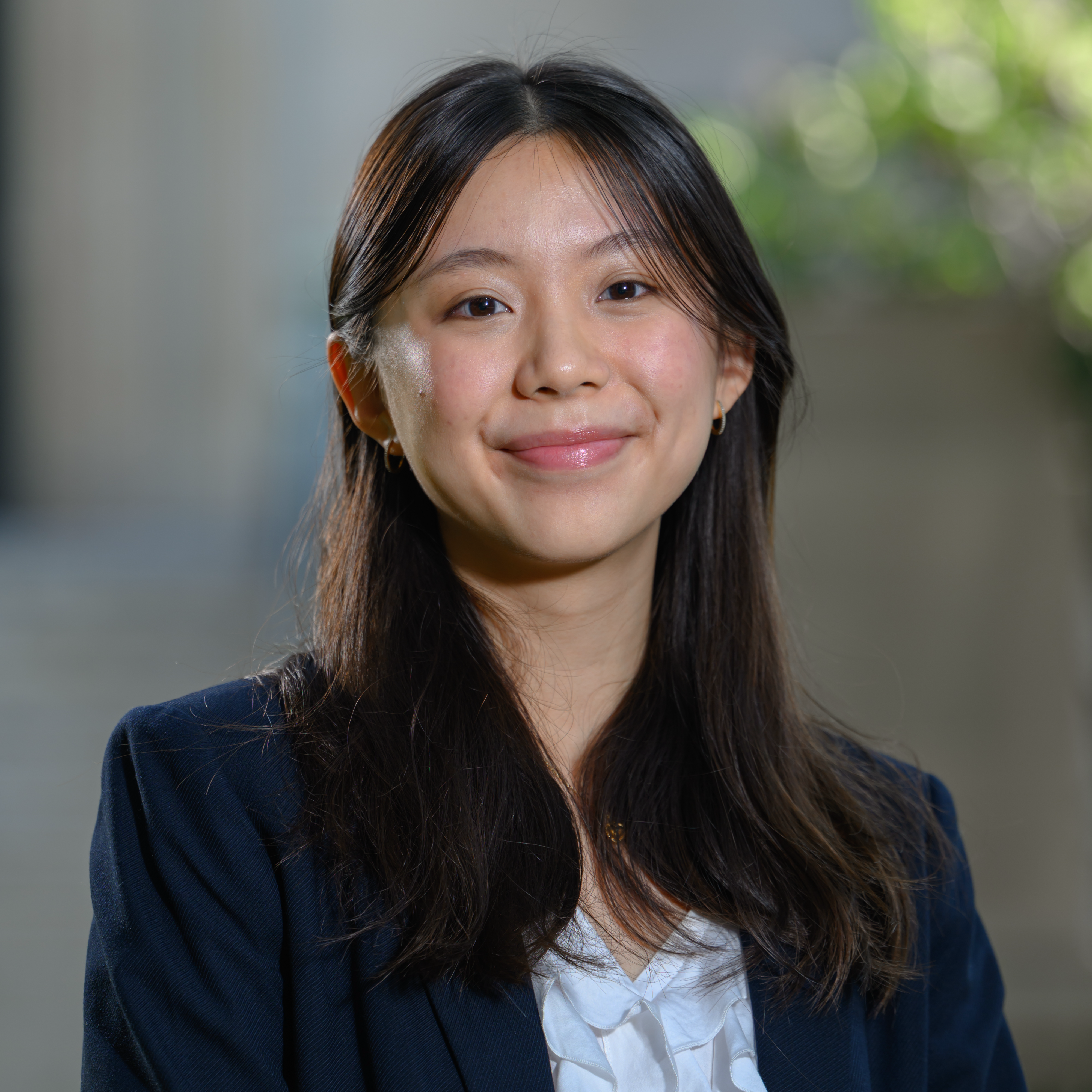
An immersive experience
For students arriving at HLS with purely academic legal backgrounds, the appeal of clinical work proves difficult to resist. Leow, hailing from Singapore before her time at Oxford, describes her undergraduate education as “very theoretical, very doctrinal.”
“It was like 1L times three years,” she explains. The autonomy offered by the HLS clinical programs stands in sharp contrast. Having studied succession law during her undergraduate degree, the Estate Planning Project of the Veterans Law and Disability Benefits Clinic was the perfect fit to put her favorite undergraduate course into practice. “In the clinic, we really do the work, not just observe,” Leow says.
Joyce Mau LL.M. ‘26, a fellow Singapore native who studied at Cambridge University before arriving at HLS, identified a similar gap in her undergraduate experience. “My undergrad was very academic, which was really great,” Mau says. “It was such a good place to train legal thinking, but I always felt like we were missing that hands-on, flexible experience.” In fact, Mau’s decision to pursue an LL.M. at Harvard stemmed largely from the clinical program itself—today, she works in LSC’s Housing Law Clinic, helping tenants facing eviction navigate Boston Housing Court.
While for some LL.M. students, eagerness to gain their first hands-on experience propels them to join a clinic, this is by no means the only reason they find themselves in a clinic. Many students have practiced law already in their home countries, and they join a clinic to gain a new perspective on a legal system that operates entirely differently from their own.
Marco Vita Mesa LL.M. ‘26 arrived at HLS with years of litigation experience in Colombia, including a stint as a clerk for a Colombian justice. He found himself drawn to LSC’s Consumer Protection Clinic not because of its familiarity, but because of its distance from the familiar: “The American legal system is challenging because it’s a common law system with different civil procedure rules in another language,” he says. Nonetheless, he found himself eager to start working with clients on matters related to debt collection, typically involving credit card debts pursued by third-party entities.
“One of the most common tasks in the clinic is representation before a clerk in small claims court,” he says. “It requires a little bit of investigation, sometimes preparing judicial briefs and documents, but the most important activity is direct representation before a clerk.”
Representing clients carries profound emotional weight, particularly when they face life-altering consequences. Vita Mesa works extensively with Spanish-speaking clients, which can forge an even closer relationship between them.
“One of my recent clients gave me a hug when we left court, because he was very grateful,” Vita Mesa recalls of a recent victory. “It makes you feel very good internally, because you are not just learning, but you are helping other people—and this is meaningful.” He acknowledges the significance of what’s at stake: “They are life-changing amounts of money that we’re saving people.”
Leow, too, finds that the significance of her estate planning work extends far beyond just providing the legal documents: “I see that clients are really grateful, because they wouldn’t know how to do it themselves otherwise.” She emphasizes her belief in the importance of accessibility: “Estate planning is so meaningful because it’s not something people think about often, but I feel passionate about helping people to get peace of mind about what happens to their affairs after they pass on. It’s normally very expensive to hire a lawyer to do these things, and that cost can put people off, but it’s such an important thing to have an estate plan.”
The drafting process involves not just wills but powers of attorney, medical directives, and healthcare proxies—”really covering everything, including financial and medical decisions while they’re still alive, not just after they pass,” Leow explains. Forging strong relationships of trust with her clients has been key; LSC’s model of client-centered advocacy has taught her to meet each different client where they are, responding to their individual wants and needs.
Client-centered advocacy is also a hallmark of the Housing Law Clinic, where Mau works with tenants facing eviction and housing instability, often navigating multiple crises simultaneously. She describes one client who has been living in a home with severe mold issues while caring for a disabled son and children with respiratory problems.
“Because of non-payment, her landlord is trying to get her out. But she is struggling to find a place, because her household needs so many things,” Mau explains. The client’s son uses a wheelchair and requires ground-floor accommodation, and the new home must be free of mold. “The process of working with a social worker to ensure that she can get the housing she needs—that’s also a very unique experience to show that sometimes it’s not just about the law, but also how can you support your client in a more social way,” Mau reflects.
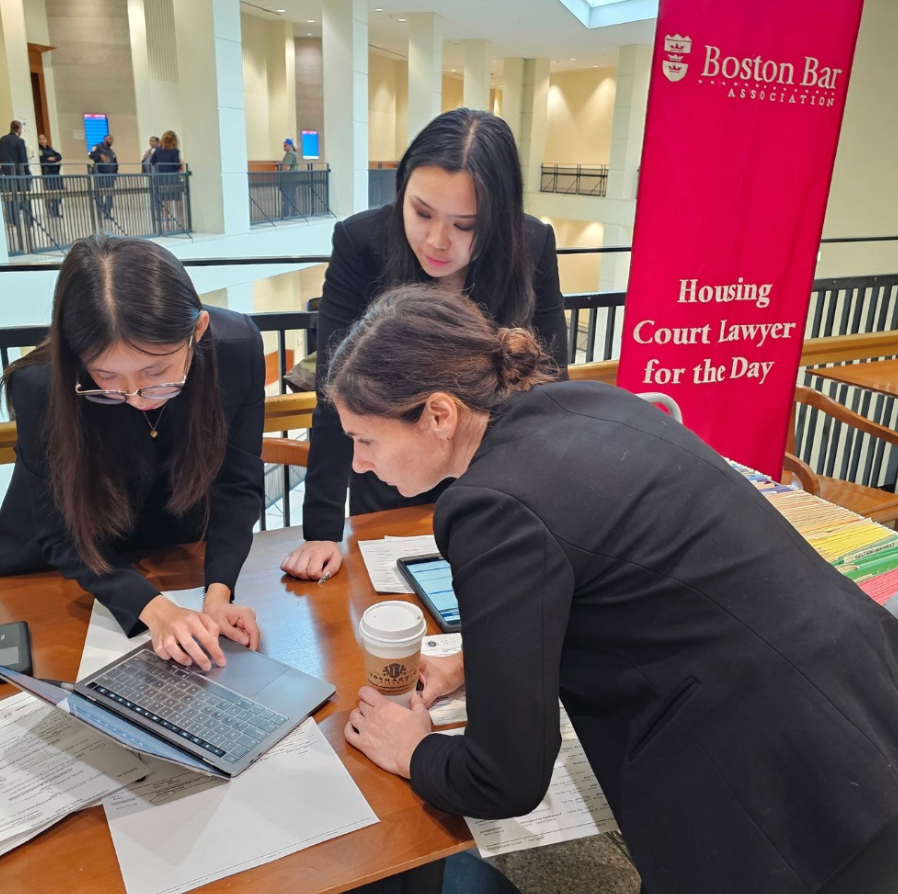
Mau’s responsibilities in the Housing Law Clinic include client calls to check in on case developments, drafting motions to advance or dismiss cases, and negotiating with landlords. “We’ll sit down with the client and talk through what we want to get out of the hearing, and then we’ll go to the opposing side and negotiate with them on behalf of our client,” she explains.
Every other week, Mau participates in attorney-for-the-day at Boston Housing Court, “assisting whoever walks in that morning.” The Housing Law Clinic team mans the table, ready to advise tenants representing themselves on their legal rights and offering representation when they can. Sometimes the team only has five minutes with a new client, assessing their situation and needs, before walking into court to represent them—a far cry from theoretical education.
Developing skills, finding community
Beyond the substantive education in their clinic’s area of the law, students report that clinical work fundamentally reshapes their understanding of legal practice. Leow, through clinic seminars and client interactions, has learned about veterans’ benefits and trauma.
“My client was just telling me about how wonderful it is that if you’re 100% rated you get all your medical expenses taken care of,” Leow says. She notes a contrast between how veterans are treated in the United States, where military service is voluntary, compared to Singapore, where two years is mandatory for all eligible men; in the U.S., she says, she has noticed a culture of honor in the country’s care for its veterans. “I thought that was really encouraging to see how people who have served the country are getting taken care of in their older age and don’t have to worry as much.”
Vita Mesa has gained practical knowledge that he can apply to his practice back in Colombia, particularly when it comes to efficiency in legal writing. “Here, you start a memo with just two sentences describing what it is about, and in one and a half pages, you solve everything. In my country, memos used to be so long, with a lot of cross references and things that are not so important,” he observes. “Having this in mind definitely will help me to be more accurate, more concrete and precise when working on a document.”
Through his appearances in smalls claims court, Vita Mesa has also noticed a uniquely collaborative culture among opposing counsel. He recalls advice from a clerk after a court appearance: “Be kind with everybody, especially with your counterparty or the opposing counsel, because you will find the same lawyers and judges in all the cases.”
LSC’s structure provides LL.M. students with institutional support as they navigate unfamiliar territory; all three students emphasize the welcoming environment and strong relationships with their clinical instructors.
Vita Mesa appreciates the understanding shown to students facing linguistic and systemic challenges. “They understand that as international students, we have different contexts. With students whose native language is not English, or who did not come from countries with common law systems, they are very kind and very patient. They are willing to help you and to explain different things to you.”
Mau is the only LL.M. student in her clinic, and she reports feeling “very much like part of the whole team.” “We all get along really well. At the same time, you’re bonding over the stress, but also commuting together, going to court together, and then talking about it afterwards.”
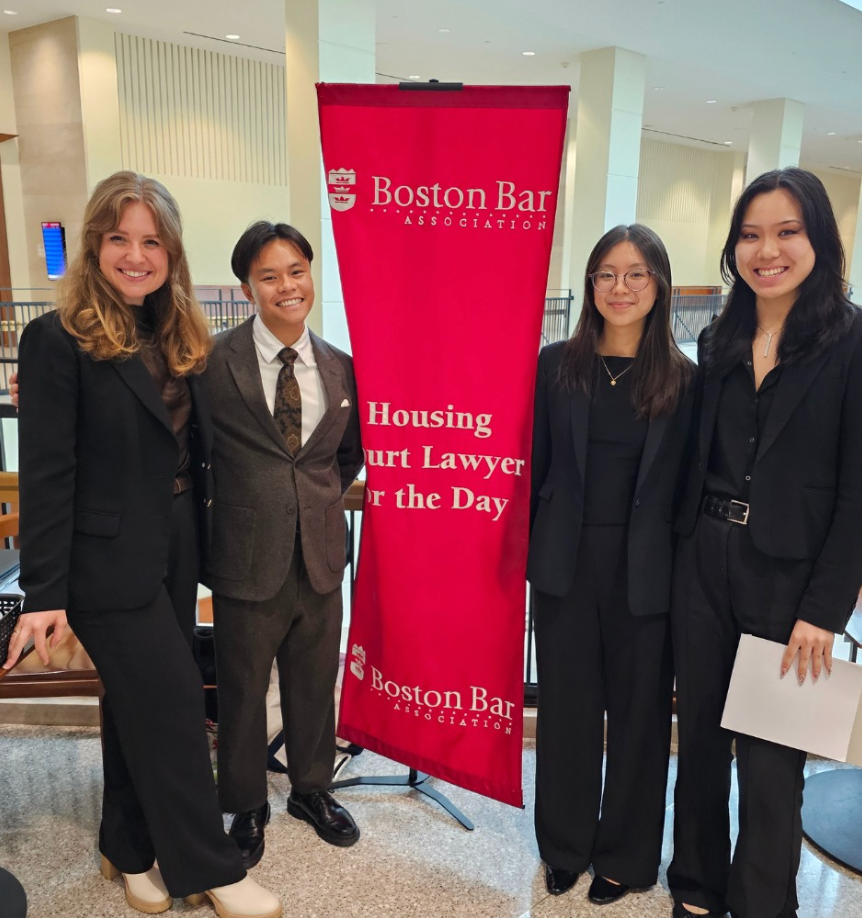
As these students look toward careers in different jurisdictions and practice areas, they concur that the clinics have endowed them with valuable skills for what comes next. Leow will return to Singapore to work as a government tax lawyer, and she now feels prepared with day-to-day lawyering skills—ethics and communication, in particular. Vita Mesa, returning to litigation in Colombia, sees immediate applications for lessons learned in American courtrooms—particularly “ways to have a quicker procedure or more clear communication among parties.”
Mau plans to work in London at a large law firm, remaining open to either corporate or litigation practice, and she feel confident that her clinical skills have made her well-prepared. “The skills you get from trying to validate a client’s experience and be an effective legal advisor—it’s pretty transferable across jobs,” she says. “Another skill that I got from the clinic is case management, knowing when to reach out to the client, when to check in with a supervisor, and when to talk to the opposing side. Because ultimately, in every legal matter, there’s always an opposing side.”
For LL.M. students weighing whether to dedicate precious credits to clinical work, the consensus is unanimous. Vita Mesa urges prospective students: “Please take a clinic. It definitely is a practice experience that you don’t have in other classes.”
Mau frames it as essential for maintaining perspective: “I would say that insight that you get into how the world actually works outside of our little bubble at Harvard is invaluable. I think it helps to keep you grounded as well, to know that what you’re working on is a real matter, and it really impacts someone’s life, and that people face these issues every day.”
For Leow, the experience was irreplaceable: “You can take courses anywhere. You wouldn’t get the HLS clinic experience anywhere.” As she prepares to conduct more community education sessions, draft more wills, and explain healthcare directives to another client, she sees how these experiences will inform her future government work. “I feel like both my clinic work now and my work in future for the government will be meaningful because I am serving the public good,” she says. “This clinic feels really meaningful to me, because I feel like I really am making a difference in people’s lives, and hopefully that will be the same in the next step in my career.”